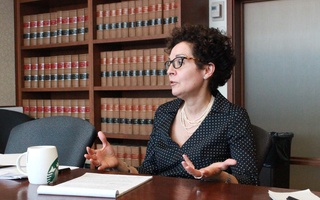{shortcode-19770feae985e970d31463871b46fbbb938e8a5d}
The federal government could still find Harvard College in violation of anti-sex discrimination law Title IX more than three years after the Office for Civil Rights first launched the probe in April 2014, according to several Title IX experts.
Since two then-undergraduates—including a member of the activist organization Our Harvard Can Do Better—filed the Title IX complaint, Harvard has overhauled its approach to sexual assault on campus, adopting a new policy and investigative process.
But federal investigators could conclude that the College is in violation of Title IX based on the policies and procedures in place when the investigation began, experts say. Some aspects of Harvard’s 2014 policies cited in the original complaint, recently obtained by The Crimson through a Freedom of Information of Act Request, were not consistent with federal guidelines.
The 38-page complaint charges that Harvard’s approach to handling sexual assault cases at the time violated Title IX. Complainants allege what they considered insufficient accommodations for students who have been sexually assaulted, inconsistent communication of University policies and resources, and misleading reporting of sexual assault statistics. They took issue with the definition of rape in the policy at the time, as well as the standard that required University investigators to be “sufficiently persuaded” an assault occurred in order to pursue disciplinary action—rather than the “preponderance of the evidence” standard set out in OCR’s 2011 “Dear Colleague” letter.{shortcode-4a9e2b3de1fa40c61e19526f2f689ed8af9a8795}
And an entire section of the complaint is devoted to final clubs, which the complainants describe as “predatory social spaces.”
The document also included testimonials from 10 students who had been sexually assaulted that were redacted in the copy the federal government provided to The Crimson.
Harvard spokesperson Rachael Dane wrote in a statement this week that the University never received a copy of the complaint. Per OCR policy, though, institutions receive a letter when OCR begins investigating them. Through the investigatory process, schools are generally able to infer the content of a complaint, according to Colby Bruno, the senior legal counsel for the Massachusetts chapter of the Victim Rights Law Center.
“The school will know every single allegation that is charged against them,” she said.
The University was already in the midst of drafting a new Title IX policy when the complaint was filed, and it completed that process in 2014. The new policy defines sexual harassment as “unwelcome conduct of a sexual nature,” which means one party “did not request or invite it” and “regarded the unrequested or uninvited conduct as undesirable or offensive.” The accompanying procedures for investigating cases of such harassment now use the “preponderance of the evidence” standard, the lower standard of proof favored by OCR and the 2014 complainants.
Over the ensuing years, former University Title IX officer Mia Karvonides created and grew the central Title IX office—which administrators restructured last spring—and took steps to publicize Title IX resources across campus. And Harvard has begun implementing the recommendations of a University-wide task force on sexual assault prevention, albeit unevenly.
Any changes in practices or resources, though, will likely go unremarked in the OCR findings, National Women’s Law Center Senior Counsel for Education Adaku Onyeka-Crawford said.
“The investigation centers in on the point in time at which the complaint was filed,” she said. “OCR is looking at what procedures were in place at that time, and then if the investigation takes longer and policies change, that doesn’t change the fact that there may have been a violation in 2014.”
If OCR determines that a school is not in line with the law, investigators propose that the institution negotiate a voluntary agreement to bring its policies into compliance with Title IX. Harvard Law School, which OCR found to be noncompliant with Title IX in 2014, opted to enter into such a resolution agreement.
But if a school declines to take part in this process, they risk losing federal funding—although the federal government has never withheld funds for this reason to date, according to Bruno and Onyeka-Crawford.
Read more in News
After Backlash, Kennedy School Withdraws Manning's FellowshipRecommended Articles
-
Law School Found in Violation of Title IX after Years-Long ProbeIn its investigation into the Law School’s Title IX compliance, the Department of Education's Office for Civil Rights found that the Law School “failed to comply with Title IX's requirements for prompt and equitable response” to complaints of alleged sexual harassment and sexual assault.
-
Activists, Law Profs Divided on Title IX DecisionStudent activists and the lawyer behind the original Law School complaint have praised the findings and expressed cautious hope for the future. Law School professors who previously denounced Harvard’s sexual harassment policy, meanwhile, criticized the decision.
-
 Between Harvard and Office for Civil Rights, A Symbiotic Relationship
Between Harvard and Office for Civil Rights, A Symbiotic Relationship -
 2014 Title IX Complaint Against Harvard Cited Final Clubs
2014 Title IX Complaint Against Harvard Cited Final Clubs -
 Harvard Facing Three Federal Title IX Investigations
Harvard Facing Three Federal Title IX Investigations












